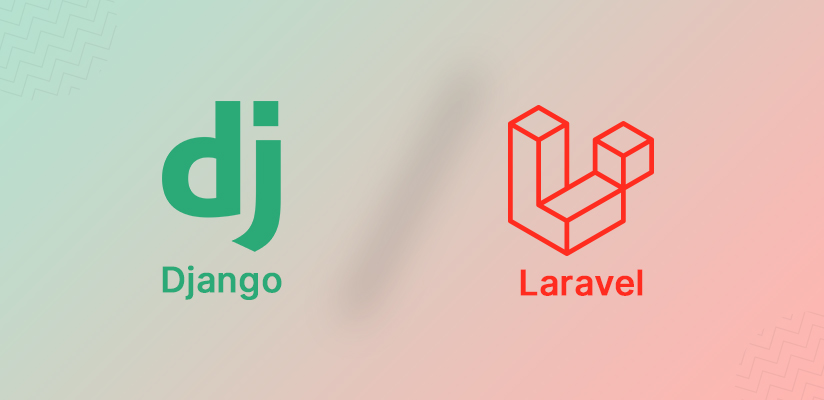- An Insight Into The Web Frameworks
- Laravel
- Django
- Comparison Between Laravel & Django
- Pros & Cons Of Laravel & Django
- In-Depth Comparison Between Laravel & Django
- When To Choose Which Web Framework?
An Insight Into The Web Frameworks
When it comes to websites and applications, web frameworks play the same role as a foundation does in a building. These frameworks lay the bedrock on which you implement your technical and creative ideas to optimize your website or application.
Frameworks are meant to perform software development with ease. They are especially helpful for those without the necessary training and expertise to write the code from scratch. With frameworks, you can alter and implement a reusable piece of code to create the best applications and new features. Frameworks contain pre-designed structures and standard codes.
There are several web frameworks available for use based on your requirements. Every one of them has its own benefits and drawbacks, but two of the most commonly used ones are Laravel and Django.
So in this blog, you will see the comparison between the two based on their features, benefits, and drawbacks. There are certain similarities between them, which will also be shown below. Moreover, you’ll understand which one you should choose and when because your choice of web framework can make or break the project.
But first, let’s see what Laravel and Django are.
Laravel
Developed in 2011, Laravel is a popular, open-sourced PHP framework known for its HTML authentication, server-side handling of routing, templating, etc. This framework is based on the symfony, another PHP framework, which is responsible for reusable PHP libraries and components. Laravel has MVC or model-view-controller. You can check the comparison of Laravel and Symfony too .
Because Laravel is a service-side framework, you can create excellent web applications with customized back-end logic, templates, pre-designed architecture, full-stack apps, and web portals. Other than that, Laravel can help you manage SaaS products effectively. That’s why this PHP development framework is used to power over eighty thousand websites.
Usually, you can hire Laravel developers to create,
- On-demand music and video streaming web applications
- Stock trading web management systems
- Multilingual content management systems
- SaaS-based web applications
- e-Learning ed-tech web apps
- Web apps with rewards and recognition features
- Self-hosted website-performance monitoring applications
Let’s check out its key features now that you know what Laravel is.
Key Features Of Laravel
The most significant features of Laravel that make it popular for PHP development are as follows:
- Pioneering Template Engine: This feature enables beginners to expert developers to develop a creative and feature-loaded website.
- MVC Architecture: Laravel PHP framework supports the model-view-controller architecture, which provides a smoother and faster development process. Through this architecture, one programmer can work on the controller for creating the business logic while another programmer works on the appearance of the web application.
- Exclusive unit-testing: This PHP developmentframework runs several unique tests to check whether the alterations in the code harm the web application. Developers can write their own test cases for the applications.
- Libraries: Unlike many other PHP frameworks, Laravel has some excellent pre-installed and object-oriented libraries.
- In-built Authentication System: Authentication is one of the most significant aspects of a website or application. It takes quite a while for the developers to write the codes. However, Laravel contains an in-built authentication system, so you only need to configure the view, models, and controllers to implement and run the application.
- Secured Migration System: Laravel ensures the developers don’t have to spend too much time and effort expanding the database. Moreover, Laravel is a secure PHP framework.
- Perfect Security: One of the most significant aspects of web application development is perfect application security. Laravel has in-built security measures. It uses the “Bcrypt Hashing Algorithm” to ensure the passwords are saved in the database in an encrypted format rather than plain text.
If you want to use all these features in your web application, hire the best Laravel development company. Now, after Laravel, let’s check out Django and its features.
Django
Launched in 2008, Django is a python web framework. It helps improve the web development process by making it faster and more secure. With Django, the developers don’t have to worry about creating every single programme from scratch. Moreover, it contains some unique features to develop creative and completely-functional web applications. Django works on MVT or model-view templates, which helps design a creative and highly-functional web application.
Because it’s a python-based web framework, Django can help create complex applications related to data science, artificial intelligence (AI), machine learning (ML), computation, etc.
Key Features Of Django
A few of the key features of Django are as follows:
- SEO-optimized: One feature that makes Django an excellent web framework is that it is SEO-optimized. In simple words, SEO means optimizing a website in a way that it appears in the top rankings on the search engine result pages. Django maintains the website through URL rather than IP address, making it easier for the SEO specialists to add the website to any server to ensure it is understandable to the search engine.
- Versatility: This python web framework can be used to create almost any kind of website. Moreover, Django can work with nearly every client-side system and provide content for HTML, RSS bolsters, JSON, XML, etc.
- Security: The loopholes that are usually left open for the back-end developers are covered by Django, which accounts for its security.
- Documentation: Django offers one of the best documentation compared to several other open-source web frameworks. Good documentation means the developers don’t have to worry about how to search for the different technical functions.
Now, after understanding Laravel and Django and their features, you might be a little confused about their differences.
Comparison Between Laravel & Django
Here is a table showing the differences between Laravel & Django:
| Factors | Django | Laravel |
| Language | Python | PHP |
| Performance & Speed | Fast (thanks to Python) | Slow in comparison |
| Architecture | MVT | MVC |
| Learning Process | Easy | Comparatively complex |
| API Support | No in-built API support; requires additional libraries | In-built API support |
| Routing | Complex | Simple |
| Scalability | Provides excellent scalability | Although still alright for small businesses, Laravel is less scalable compared to Django. |
| Microservices | Django is highly compatible with microservices, ensuring versatility, rapid deployment, and built-in security. | Although thanks to PHP, Laravel provides good support for microservices, you will need Lumen (the lighter version of Laravel) to get the best out of it. |
Pros & Cons Of Laravel & Django
Here are the pros and cons of Laravel & Django:
Pros of Laravel
- An excellent templating system that offers the power to create complex applications and format large data. This function also allows the developer to add new features without making any alterations to the core system.
- Includes reverse routing, which automatically creates the Uniform Resource Identifiers (URIs).
- The pre-packaged tools for API testing and user authentication in Laravel smoothen the tasks necessary for developing creative yet highly-functional web applications.
- Thanks to expressive methods simulating human behavior, testing is quick and automated.
- Artisan CLI offers automation of any application-specific recurring task.
Cons Of Laravel
- Although being an open-source platform is one of Laravel’s advantages, it may also lead to too many relatively-unreliable libraries.
- Excessive back-end congestion due to its lightweight nature.
Pros Of Django
- Seamless scalability for growing businesses.
- Offers flexibility to make significant changes to the code during development.
- Since it is based on Python, Django has some of the best developers to create the best web applications.
- Some of Django’s features ensure quick development and a reduced time-to-market.
- Due to its statistical and computational capabilities, Django is preferred for machine learning, enabling you to add more advanced features to your applications.
- Django is highly-secure against SQL injections, cross-site request forgery, clickjacking, etc.
Cons of Django
- One of the most significant drawbacks of Django is that it can’t handle multiple requests simultaneously.
- Because Django occupies loads of server processing time and bandwidth, you will have to think long and hard before scaling your business.
These pros and cons might be enough to help you make a decision about which one to choose. Although there are some unreliable libraries, you can contact the best Laravel development company to improve their reliability. If you are still unable to make a decision, let’s check out an in-depth comparison between Laravel & Django.
In-Depth Comparison Between Laravel & Django
Laravel and Django will be compared based on a few relevant aspects:
Which One Is More Popular
Django is used by over 81K websites, while over 133K websites use Laravel. So you can see both of them are very popular. But when you try to compare them, you’ll see Django is highly popular in Leisure & Hobbies and Science & Education web applications. At the same time, Laravel is preferred by Arts & Entertainment, Finance, Computer & Electronics, Business & Consumer Services, and Law & Government web applications.
Performance
Although Laravel has some incredible in-built tools and features, Django has better performance in comparison. But you can hire Laravel developers to ensure they get the best out of the Laravel tools.
Architecture
Laravel follows the MVC architecture, which ensures complete control of the whole app, helps effectively divide the workload, and focuses on the different segments without affecting others. Django follows the MVT architecture, which makes it preferable for immediate modifications and scalability.
Scalability
Although both web frameworks are scalable, Django has the edge over Laravel because of its compatibility with additional support technologies.
Community
With more than 82K members on Reddit, 28K forks and 66.9K stars on GitHub, and almost 250K questions on StackOverflow, Django has a massive active community. On the other hand, Laravel has almost 46k active users, 23k Forks, and 71.2K stars on GitHub, and it takes only about 3 days at max to get the solution to your queries on the community forums.
Learning Curve
Django is simpler and easier to learn than Laravel.
REST API
Laravel has in-built API support. But Django does not possess any in-built features making it easier to develop APIs. So Laravel has the edge when it comes to APIs.
Security
Because it is based on Python, Django is much more secure than Laravel.
Testing & Debugging
Both Django & Laravel offer a wide array of tools to ensure excellent testing and debugging capabilities.
Supported Libraries
Both Django & Laravel have comprehensive pre-installed and object-oriented libraries to ensure the development of the most creative and functional web applications.
Microservices Compatibility
Django is highly compatible with microservices, ensuring versatility, rapid deployment, and built-in security. Although thanks to PHP, Laravel provides good support for microservices, you will need Lumen (the lighter version of Laravel) to get the best out of it. So Django has the edge over Laravel in this aspect.
Documentation
Django is far ahead of Laravel when it comes to documentation capabilities.
Although Laravel is far behind Django in several aspects, you can hire the best Laravel development company to ensure an excellent web application based on the PHP framework.
When To Choose Which Web Framework?
Now, after seeing the in-depth comparison and pros and cons, you might be quite confused about which one you should choose and when.
You should hire Laravel developers when you want to:
- Build a web application for the ed tech industry
- Build apps with rewards and recognitions feature
- Create a performance-tracking application
- Develop websites with on-demand videos and audio
- Create multilingual CMSs
- Build stock trading management systems
- Create interactive website layouts.
You can go for Django when:
- Developing back-end APIs
- Developing data-driven applications travel, food, or hospitality industry
- Creating web applications integrated with machine learning
- Developing scalable web applications of all sizes
- Creating data-powered web applications
- Creating a dynamic and highly-customizable social media website
- Developing ORM support for web applications.
At last, it is safe to say that the web framework you choose depends on your requirements. If your requirements dictate you will need a PHP-based framework and all its tools and features for your web application, you should go for the best Laravel development company. But if you are going to need a Python-based framework for all its benefits and features, go for Django instead.





